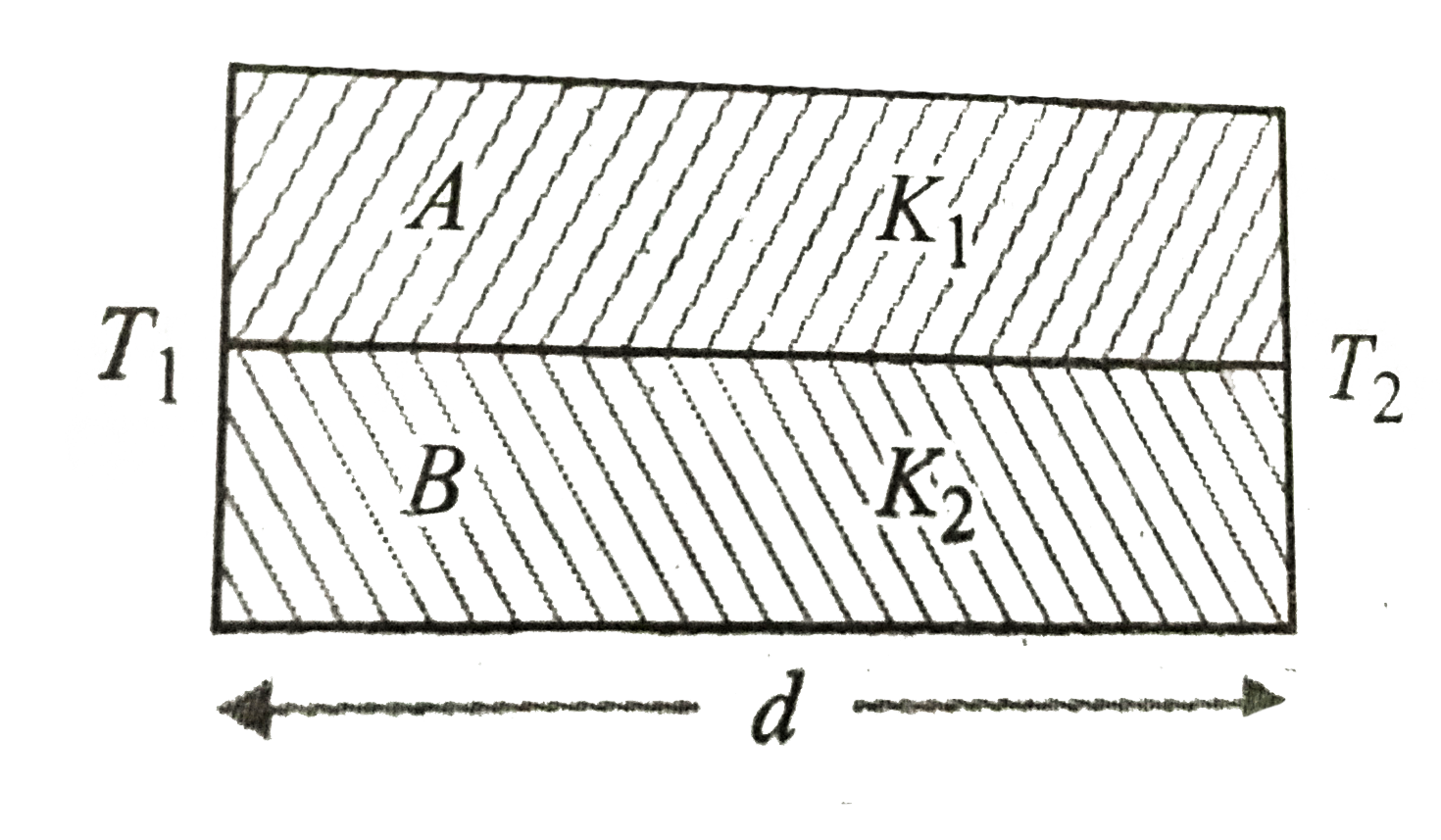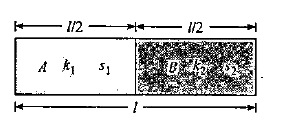Two rods A and B of different materials are welded together as shown in figure. Their thermal conductivities are K1 and K2. The thermal conductivity of the composite rod will be

3(K1+K2)2
K1+K2
2(K1+K2)
K1+K22
The correct Answer is:D
Thermal resistance (R)=kAl
Req=R1R2R1+R2
(∵ for parallel)
l2keqA=lk1A+lk2A
Thermal resistance (R)=lkA
Rods are in parallel combination
Req=R1R2R1+R2
lKeq(2A)=lK1A⋅lK2AlK1A+lK2A=1K1K2lA1K1+1K2
=1K1K2lAK1+K2K1K2=1(K1+K2)lA
⇒Keq=K1+K22
Topper's Solved these Questions
- THERMAL PROPERTIES OF MATTER Book:PHYSICS WALLAHChapter:THERMAL PROPERTIES OF MATTER Exercise:Level- 2
Explore 30 Videos
- SYSTEM OF PARTICLES AND ROTATIONAL MOTION Book:PHYSICS WALLAHChapter:SYSTEM OF PARTICLES AND ROTATIONAL MOTION Exercise:NEET PAST 5 YEARS QUESTIONS
Explore 22 Videos
- THERMODYNAMICSBook:PHYSICS WALLAHChapter:THERMODYNAMICSExercise:NEET Past 5 Years Questions
Explore 14 Videos
Similar Questions
A slab consists of two parallel layers of two different materials of same thickness having thermal conductivities K1andK2. The equivalent conductivity of the combination is
View SolutionTwo rods of the same length and diameter, having thermal conductivities K1 and K2, are joined in parallel. The equivalent thermal conductivity to the combinationk is
View Solution
Knowledge Check
Two rods A and B of different materials are welded together as shown in figure. Their thermal conductivities are K1 and K2. The thermal conductivity of the composite rod will be
 A3(K1+K2)2BK1+K2C2(K1+K2)DK1+K22
A3(K1+K2)2BK1+K2C2(K1+K2)DK1+K22The thermal conductivity of a rod depends on
AlengthBmassCarea of cross sectionDmaterial of the rod.A slab consists of two layers of different materials of the same thickness and having thermal conductivities K1 and K2. The equivalent thermal conductivity of the slab is
AK1+K2BK1K2K1+K2C√K1K2D2K1K2K1+K2
A composite slab consists of two slabs A and B of different materials but of the same thickness placed one on top of the other. The thermal conductivities of A and B are k1 and K2 respectively. A steady temperature difference of 12∘C is maintained across the composite slab. If k1=K2/2, the temperature difference across slab A will be:

View SolutionTwo slabs A and B of different materials but of the same thickness are joined end to end to form a composite slab. The thermal conductivities of A and B are K1 and K2 respectively. A steady temperature difference of 12∘C is maintained across the composite slab. If K1=K22, the temperature difference across slab A is
View SolutionA wall has two layers A and B each made of different materials. The thickness of both the layers is the same. The thermal conductivity of A, KA=3KB. The temperature different across the wall is 20∘C in thermal equilibrium
View SolutionTwo rods of the same length and diameter having thermal conductivities K1 and K2 are joined in parallel. The equivalent thermal conductivity of combination is
View SolutionTwo rods of the same length and diameter having thermal conductivities K1 and K2 are joined in parallel. The equivalent thermal conductivity of combination is
View Solution
